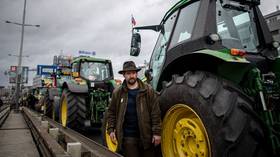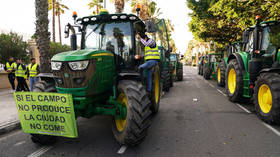Czech prime minister labels protesting farmers ‘supporters of Moscow’

Czech Prime Minister Petr Fiala has claimed farmers protesting against EU agriculture policies, environmental requirements and high energy prices are “supporters of Russia”.
On Monday, hundreds of tractors blocked off sections of Prague and disrupted traffic outside the country’s Agriculture Ministry as demonstrators demanded that the EU’s Green Deal, which calls for regulations on the use of certain chemicals and greenhouse gas emissions, be rejected.
The farmers have argued that the Brussels' proposals place a heavy burden on their businesses, making products more expensive and less competitive, especially when compared to non-EU imports, such as those coming from Ukraine.
In a post on X (formerly Twitter), however, Fiala dismissed the demonstration and suggested that the farmers who took their tractors to Prague on Monday have “little to do with the fight for better conditions for farmers.”
“The demonstration is organized by people who, for example, do not hide their support for the Kremlin and pursue goals other than the interests of farmers,” Fiala wrote, adding that the Czech government would only deal with those who “really represent farmers and talk together about what our agriculture needs.”
He also noted that Monday’s protests in the Czech capital were not organized by the country’s largest farmers organizations, such as the Agrarian Chamber, the Agricultural Union, and the Association of Private Agriculture.
The three groups have announced plans to hold a separate demonstration against the EU’s green policies on Thursday in a joint action with farmers’ associations from other EU member states. The Agrarian Chamber has stated that farmers will lead their tractors and other machinery in convoys to the Czech border, but have stressed that the demonstration would be symbolic and will not interfere with the operation of the border.
Similar protests have swept the EU in recent months, taking place in countries like Poland, France, Spain, Italy, Belgium, Hungary, Bulgaria, Latvia, and Slovenia. Demonstrators have been demanding more government aid for the agriculture sector, less bureaucracy from Brussels, as well as tighter controls on imports from non-EU countries.













